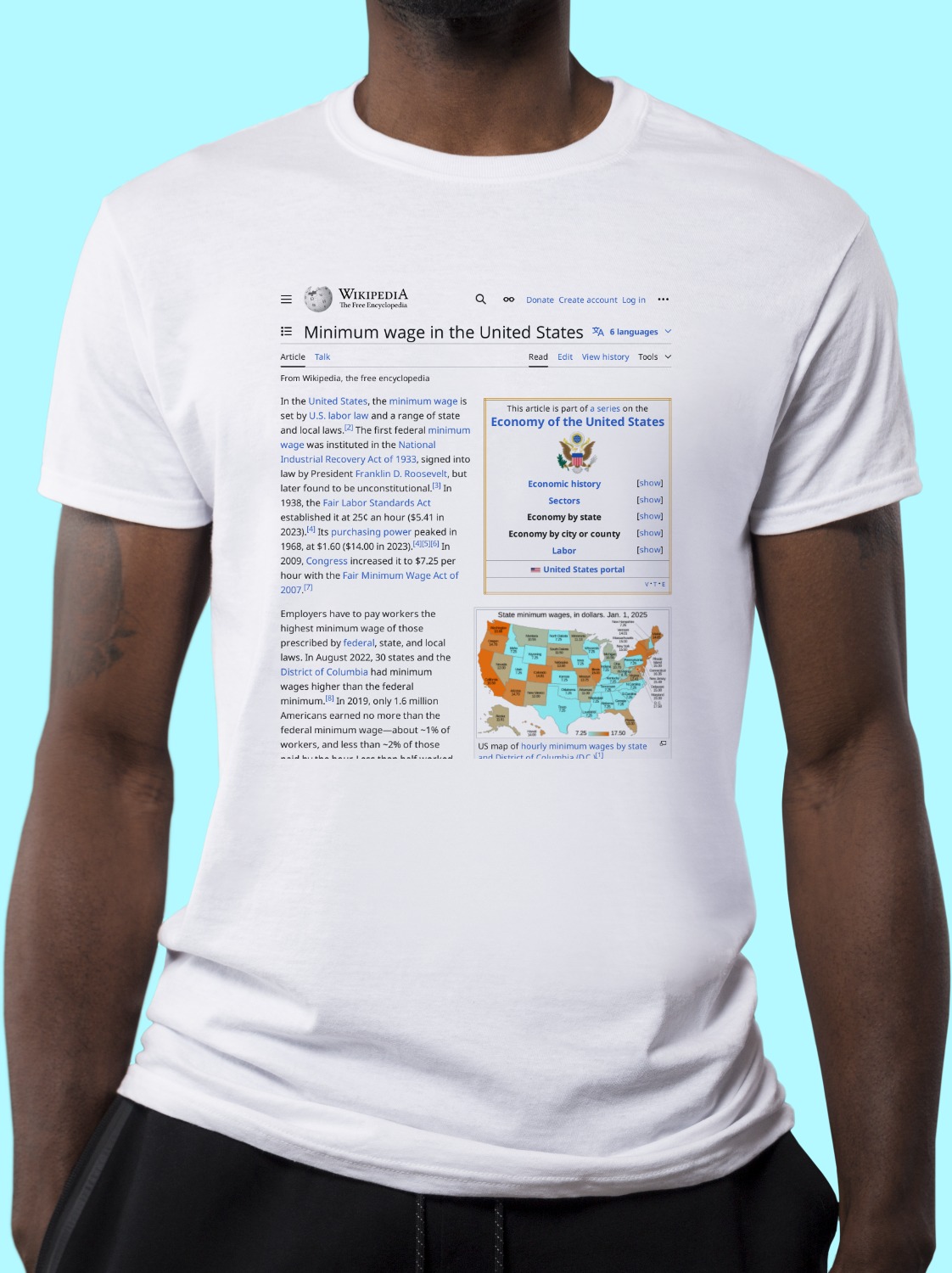
Minimum wage in the United States Shirt
A classic cotton tee emblazoned with the Wikipedia article on Minimum wage in the United States ↗.
cotton tee emblazoned with the Wikipedia article on Minimum wage in the United States ↗.- Preshrunk jersey knit
- Seamless double-needle 2.2 cm collar
- Taped neck and shoulders
- Tear away label
- Double-needle sleeve and bottom hems
- Quarter-turned to eliminate centre crease
In the United States, the minimum wage is set by U.S. labor law and a range of state and local laws. The first federal minimum wage was instituted in the National Industrial Recovery Act of 1933, signed into law by President Franklin D. Roosevelt, but later found to be unconstitutional. In 1938, the Fair Labor Standards Act established it at 25¢ an hour ($5.58 in 2024). Its purchasing power peaked in 1968, at $1.60 ($14.47 in 2024). In 2009, Congress increased it to $7.25 per hour with the Fair Minimum Wage Act of 2007.
Employers have to pay workers the highest minimum wage of those prescribed by federal, state, and local laws. In August 2022, 30 states and the District of Columbia had minimum wages higher than the federal minimum. As of July 2025, 22 states and the District of Columbia have minimum wages above the federal level. In 2019, only 1.6 million Americans earned no more than the federal minimum wage—about ~1% of workers, and less than ~2% of those paid by the hour. Less than half worked full time; almost half were aged 16–25; and more than 60% worked in the leisure and hospitality industries, where many workers received tips in addition to their hourly wages. No significant differences existed among ethnic or racial groups; women were about twice as likely as men to earn minimum wage or less.
In January 2020, almost 90% of Americans earning the minimum wage were earning more than the federal minimum wage due to local minimum wages. The effective nationwide minimum wage (the wage that the average minimum-wage worker earns) was $11.80 in May 2019; this was the highest it had been since at least 1994, the earliest year for which effective-minimum-wage data are available.
In 2021, the Congressional Budget Office estimated that incrementally raising the federal minimum wage to $15 an hour by 2025 would impact 17 million employed persons but would also reduce employment by ~1.4 million people. Additionally, 900,000 people might be lifted out of poverty and potentially raise wages for 10 million more workers. Furthermore, the increase would be expected to cause prices to rise and overall economic output to decrease slightly, and increase the federal budget deficit by $54 billion over the next 10 years. An Ipsos survey in August 2020 found that support for a rise in the federal minimum wage had grown substantially during the COVID-19 pandemic, with 72% of Americans in favor, including 62% of Republicans and 87% of Democrats. A March 2021 poll by Monmouth University Polling Institute, conducted as a minimum-wage increase was being considered in Congress, found 53% of respondents supporting an increase to $15 an hour and 45% opposed.
About Wikishirt
Wikishirt is a retail experiment that lets you buy a shirt with any Wikipedia Article printed on it. There are over 5 million Wikipedia articles, so we have over 5 million shirts.Check out our homepage for random featured shirts and more!